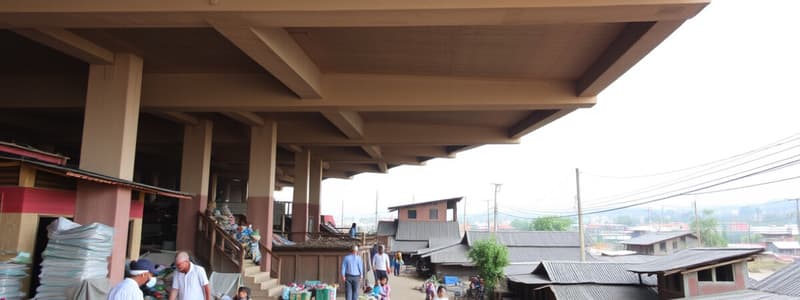Podcast
Questions and Answers
What must the growth rate exceed for per capita income (PCY) to rise if population growth is at 2%?
What must the growth rate exceed for per capita income (PCY) to rise if population growth is at 2%?
- 5%
- 3% (correct)
- 1%
- 2%
Which country is mentioned as having a net savings-investment ratio exceeding 30%?
Which country is mentioned as having a net savings-investment ratio exceeding 30%?
- India
- China (correct)
- Brazil
- Nigeria
What is one consequence of rapid population growth in poor countries?
What is one consequence of rapid population growth in poor countries?
- Overcrowding and congestion (correct)
- Increased income per head
- Decreased unemployment rates
- Improved government resources
Which of the following is NOT a disadvantage of exports dominated by primary commodities?
Which of the following is NOT a disadvantage of exports dominated by primary commodities?
What issue does weak institutional structure contribute to in developing countries?
What issue does weak institutional structure contribute to in developing countries?
What term describes the phenomenon where countries dependent on primary products grow slower due to economic issues?
What term describes the phenomenon where countries dependent on primary products grow slower due to economic issues?
Which law states that income elasticity of demand for manufactured imports is greater than 1?
Which law states that income elasticity of demand for manufactured imports is greater than 1?
What is a significant problem caused by rapid population growth in poor countries?
What is a significant problem caused by rapid population growth in poor countries?
What is a significant problem associated with high levels of inequality?
What is a significant problem associated with high levels of inequality?
Which method provides a better measure of growth in terms of welfare?
Which method provides a better measure of growth in terms of welfare?
According to the stages of development, what is the first stage identified by Rostow?
According to the stages of development, what is the first stage identified by Rostow?
Which statement best describes the transition of countries in the development process?
Which statement best describes the transition of countries in the development process?
Which countries are cited as examples that have become rich based solely on agriculture?
Which countries are cited as examples that have become rich based solely on agriculture?
What is the primary sector where over half of the population in developing countries typically works?
What is the primary sector where over half of the population in developing countries typically works?
Which of the following best describes the level of labour productivity in the agricultural sector of developing countries?
Which of the following best describes the level of labour productivity in the agricultural sector of developing countries?
What characterizes the demand for most agricultural goods in developing countries?
What characterizes the demand for most agricultural goods in developing countries?
What ratio is essential for sustained growth of per capita income in developing economies?
What ratio is essential for sustained growth of per capita income in developing economies?
Which of the following best explains disguised unemployment in agriculture?
Which of the following best explains disguised unemployment in agriculture?
In Rostow's stages of growth, what is required for the process of capital accumulation?
In Rostow's stages of growth, what is required for the process of capital accumulation?
Which region has the highest percentage of its population employed in agriculture?
Which region has the highest percentage of its population employed in agriculture?
What does Engel's Law imply about agricultural goods?
What does Engel's Law imply about agricultural goods?
What is a common result of low levels of capital accumulation in developing economies?
What is a common result of low levels of capital accumulation in developing economies?
Which characteristics are often associated with primary commodity exports in developing nations?
Which characteristics are often associated with primary commodity exports in developing nations?
What is the primary hypothesis associated with Kaldor’s growth laws?
What is the primary hypothesis associated with Kaldor’s growth laws?
Which factors contribute to high unemployment and underemployment in poor countries?
Which factors contribute to high unemployment and underemployment in poor countries?
What does Kaldor’s 1st Law state about the relationship between manufacturing output and GDP growth?
What does Kaldor’s 1st Law state about the relationship between manufacturing output and GDP growth?
How does manufacturing growth affect productivity outside of manufacturing according to Kaldor’s 3rd Law?
How does manufacturing growth affect productivity outside of manufacturing according to Kaldor’s 3rd Law?
What is a characteristic of poor countries concerning their economic structure?
What is a characteristic of poor countries concerning their economic structure?
Which of the following statements reflects the Fisher-Clark thesis?
Which of the following statements reflects the Fisher-Clark thesis?
What contributes to vertical inequality in economic systems?
What contributes to vertical inequality in economic systems?
According to Kaldor’s growth laws, what effect does manufacturing have on productivity in non-manufacturing sectors?
According to Kaldor’s growth laws, what effect does manufacturing have on productivity in non-manufacturing sectors?
What is often referred to as the 'curse' of natural resources in the context of economic development?
What is often referred to as the 'curse' of natural resources in the context of economic development?
What role do institutions play in development according to the learning objectives?
What role do institutions play in development according to the learning objectives?
What primary factor discourages entrepreneurs from investing in a society?
What primary factor discourages entrepreneurs from investing in a society?
What is likely to occur as a result of poor governance and weak institutions?
What is likely to occur as a result of poor governance and weak institutions?
Which region is signified as having weak institutions due to a colonial history focused on resource extraction?
Which region is signified as having weak institutions due to a colonial history focused on resource extraction?
What percentage of the labor force in poor countries is estimated to be unemployed or underemployed according to the ILO?
What percentage of the labor force in poor countries is estimated to be unemployed or underemployed according to the ILO?
What form does disguised unemployment take in rural areas?
What form does disguised unemployment take in rural areas?
Which type of inequality is measured by the Gini ratio?
Which type of inequality is measured by the Gini ratio?
What describes the relationship between vertical inequality and economic development according to the Kuznets curve?
What describes the relationship between vertical inequality and economic development according to the Kuznets curve?
What is an example of horizontal inequality?
What is an example of horizontal inequality?
Study Notes
Characteristics of Underdevelopment
- Over half of the population in developing countries is engaged in agriculture, primarily as subsistence or tenant farmers.
- Labor productivity in agriculture is notably low, averaging less than $500 per year or $1.90 daily.
- Disguised unemployment is prevalent due to diminishing returns to labor in agriculture.
- Demand for agricultural goods is income inelastic, while industrial goods exhibit higher productivity and demand.
Employment Distribution by Sector
- Significant agricultural employment varies by region:
- Sub-Saharan Africa (71.2% agriculture)
- Southern Asia (67.5%)
- Latin America and the Caribbean (43.3%)
- Industrial and service sectors represent a smaller percentage of employment in low-income countries compared to high-income nations.
Low Level of Capital Accumulation
- Economic development requires capital accumulation, but low savings and investment hinder growth.
- A savings-investment ratio exceeding 10% of GDP is needed for sustainable increases in per capita income.
- China's savings-investment ratio of over 30% is a key factor in its rapid growth.
Rapid Population Growth
- Developing countries experience population growth rates exceeding 2% annually, compared to 0.5% in developed nations.
- High population growth exacerbates poverty, leading to a cycle of diminished income per head.
- Young age distribution in developing nations poses challenges to resources and governance.
Dependence on Primary Commodities
- Reliance on primary commodities creates economic vulnerabilities including:
- Long-term deterioration in terms of trade.
- Balance of payments issues due to income elasticity disparities.
- Price volatility resulting in macroeconomic instability.
- Countries dependent on natural resources often face slower economic growth.
Weak Institutional Structures
- Weak institutions are a fundamental cause of underdevelopment, affecting investment and entrepreneurship.
- Significant issues include poor governance, lack of rule of law, and corruption leading to civil strife in affected regions.
Other Dimensions of Development Gap
- High unemployment and underemployment levels are prevalent, with one-third of the labor force either fully or disguised unemployed.
- Disguised unemployment is common in both rural and urban settings, particularly in low-productivity sectors.
- Rural-to-urban migration worsens unemployment in cities, creating additional economic pressure.
Inequality: Vertical and Horizontal
- Income, wealth, and power distribution is markedly unequal, with two primary inequality types: vertical (income disparity across households) and horizontal (discrimination based on social categories).
- Vertical inequality initially increases with development, then declines, as represented by the Kuznets curve.
- Horizontal inequality is a significant contributor to conflict and hampers development.
Growth and Distribution
- Debate exists over whether economic growth benefits the poor relative to the rich, with inequality potentially harming overall growth prospects.
- Poverty-weighted growth rates offer a better perspective on welfare improvements by emphasizing income gains for the poor.
Stages of Development and Structural Change
- Few countries (e.g., Australia, New Zealand) have transitioned to wealth based solely on agriculture.
- Rostow’s stages of growth delineate a path from traditional agricultural economies to high mass-consumption societies, shifting towards manufacturing and services.
- Newly industrializing countries exhibit rapid growth through resource shifts and technological specialization.
Industrialization and Growth
- Strong correlations exist between manufacturing growth and overall GDP growth, emphasizing the role of manufacturing in productivity gains.
- Kaldor’s growth laws suggest significant positive relationships between growth in manufacturing output and GDP, manufacturing productivity, and productivity outside manufacturing.
Key Learning Objectives
- Understand common characteristics of underdeveloped countries including low productivity agriculture and weak institutions.
- Recognize the implications of high unemployment and inequality.
- Comprehend the relevance of industrialization and Kaldor’s growth laws in economic development.
Studying That Suits You
Use AI to generate personalized quizzes and flashcards to suit your learning preferences.
Related Documents
Description
This quiz explores the characteristics of underdevelopment and structural changes detailed in Chapter 3 of Economics of Development. Key topics include the dominance of agriculture, low capital accumulation, and the implications of rapid population growth. Additionally, delve into how inequality and institutional weaknesses contribute to the development gap.




